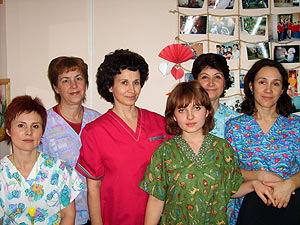Tennis and Charity for Moldovans
Eleven years after the release of his book ‘Playing the Moldovans at Tennis’, Hawks has left behind a legacy in the country far more pertinent than a string of defeated national footballers. With the help of ChildAid and Diana Covalciuc, the doctor with whom he stayed with whilst researching the book, he founded the Hippocrates Centre in Chişinău which looks to ease the suffering of some of society’s most underprivileged children by offering free consultations and medical services to those who have chronic illnesses of the neuro-muscular, cardio-vascular or respiratory systems.
The Hippocrates Centre cares for children from birth up to the age of 15, and this year has so far treated 170 patients who attend 90-minute sessions at the clinic and receive one-on-one treatment from one of its six volunteers. Hawks stated that he “wanted to give something back to Moldova” after writing the book, and helped to establish the centre in 1998, which was opened in December 2000. Despite its life-changing work, the Hippocrates Centre needs $50,000 a year to survive and is in dire need of $150,000 to build a new and improved clinic that Hawks is currently spearheading a campaign for.
To help reach this target, he donates half of the royalties from his 250,000-selling book and all of the proceeds from sales of his band Probably Peru’s CDs, although he admitted that “things are tough right now for fundraising… we’re a long way off I’m afraid.” Covalciuc runs the charity from an apartment in Chişinău, but said that “it is very difficult to work from here, there is not much space and we only have one bathroom – there are two children in every room.”
Only in the last couple of years has the centre begun to receive funding from the government, but Hawks affirmed that it is not just their attitude that needs to change. He has returned on four occasions to Moldova and said that on his last visit he “heard stories from the parents who visit Hippocrates that they are often shouted at by other members of the public as they use the buses that they should send their children away to an orphanage and keep them away from them.” It’s a sentiment echoed by Covalciuc, who stated that even some doctors in other hospitals had told parents that it would be a “waste of time” to treat their children.
But at the Hippocrates Centre they receive physiotherapy, therapeutic massages and occupational and speech therapy, yet the tiny clinic’s success has outgrown its current location and they “have to turn away some children,” Covalciuc said with great sorrow. She hoped that via a bigger centre they would not only be able to treat more children who are in need of their assistance, but would also seek to enlist the help of more volunteers and build a hydrotherapy pool.
Faintly smiling, she said that her dream was to expand the number of clinics in Moldova and to help children in schools and villages across the country, and not just in Chişinău. It was a view reiterated by Hawks, who told Ziarul de Gardă that he hoped that the Hippocrates Centre would be able to “reach more families who need help. And slowly, to re-educate the people of Moldova and show them that people with disabilities are not creatures to be shunned or to be ashamed of.”




